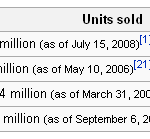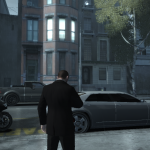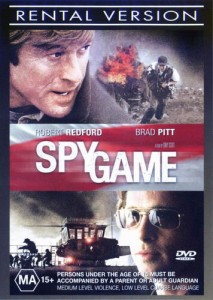Another relatively quiet week. There are actually lots of news stories, but most of them say the same things, are followups to (or just really really late versions of) previous week’s news stories, and some are nothing more than PR fluff pieces. I try to filter out these kinds stories, and only report on the important, interesting ones. When I’m not busy playing games that is. Or rather than playing, let’s say “fixing” instead, because that’s what playing GTA IV feels like. Rockstar’s PC efforts have always been poorer cousins of the console versions, but GTA IV in its current state takes the bugginess to a whole new other level. Read my blog post to find out more about how to fix or work around some of the more annoying bugs, but nothing I wrote really helps to make the problems go away, only to make them slightly more manageable.

In Copyright news, the owner of Filesoup, one of the oldest torrent sites around, has been arrested. His home was raided, things left in a complete mess, he was denied a phone call or access to legal council for 7 hours, and the Filesoup website is still up and running.
Since when did these sorts of copyright infringements, something that at worst only does monetary damage to billion dollar corporations, become such a serious offence that the police need to get involved? Are there no terrorist left to capture? No murderers to apprehend? The copyright lobby has been telling governments around the world scary bed time stories in an effort to scare them into doing things against the very principles of democracy, against the constitutions of their respective countries, and against normal legal procedure, and it’s all working. And that’s just the ones that get to court – governments at the behest of copyright agencies are still trying to bring in a 3 strike system where they can get rid of this little thing called due process entirely. But the ones that do get to court, are even more notorious, just like the recent two cases with the 6 and 7 figure damages being rewarded against defendants that probably don’t even have 6 or 7 thousand dollars in their names.
The rewards were so outrageous, that even copyright lawyers representing the content owners are not too happy at the damages being rewarded, fearing it may backfire. Content owners want to use these damage rewards to deter future infringements, but too much money and it may force the courts and the government to step in a put a limit on things, due to the public backlash. But does anyone really thing this will stop piracy? Every copyright warning message, yes including those annoying ones you can’t skip on DVDs, point out the possible consequences of piracy – a large fine and even prison time, but why do people still pirate stuff? Is it because they have no alternative, as they can’t afford it, like the cost of filling up your average iPod with purchased music? Is it because illegal downloads are easier and more user friendly, not having to go to shops to buy DVDs, and no DRM? Or as in some cases, you aren’t being allowed to purchase something until the content owners have maximised their profits through rental agreements, TV licensing, tiered releasing, and that the only alternative becomes downloads?

This is an example of an Xbox 360 mod kit. Some mod kits are the first step towards making Xbox 360's play backup games
But the law is on the side of content owners, ever since they pushed the DMCA through the US congress, on the back of fears that the digital revolution was going to bring about the end of capitalism as we know it. And the politicians believed them, even easier to do so when you have large contributions to smooth your doubts. The latest case is that of an Xbox 360 modder has been arrested and could face 10 years in prison, thanks to the DMCA. See under the DMCA, you don’t have to actually do damage to anyone to break this law. All you have to do is to circumvent copyright protection, regardless of how badly implemented the copy protection may be, or what you intend to do after copy protection has been broken. I could mod my Xbox 360, and then smash it up so that it won’t work anymore, and yet, I’ve still broken the DMCA (if I was an American, of course). Or take a more common situation, where I mod my Xbox 360 so I can play backups of my legally purchased games that the Xbox 360 keeps on scratching (through the well known design fault, or just through daily abuse). Now if I do this, then who am I hurting exactly? Not Microsoft or the game publishers, because I’m still buying games from them. In fact, the only one I may have hurt is myself as I might have just voided my warranty. And I’m actually helping Microsoft by not bringing in the console to repair the disc scratching problem. But I’ve still broken the DMCA and I could face big fines and time in prison. Some countries have laws where you’re guilty until proven innocent – the DMCA simply assumes you’re guilty in all situations.
Speaking of game consoles, Nintendo’s DS is one of the most pirate friendly consoles around, thanks to flash carts. Nintendo still makes big money from the DS though, and the DS’s popularity is probably directly linked to the ease in which you can play backup or pirated games on it. The DSi, Nintendo’s update for the DS, was supposed to address this by introducing frequently firmware updates that disables flash carts from being used. The latest version, 1.4, managed to do to almost all known flash carts, but it only took a week for the flash cart manufacturers to bring out their own firmware update that made piracy possible again. If you can play it, you can copy it (and play the copy) – that’s that conclusion I’ve come up with after many years of observing various copy protection methods. Again, it goes back to the point of how one stops piracy, and perhaps some of the things I listed above like looking at prices, release schedules, and making purchases easier, are way more effective than firmware updates. Or even putting your hands up and admitting, okay our system is pirate friendly, but that’s why it’s so popular and it’s something we have to live with.
The Australia ISP, iiNet, is still engaged in legal battle with Australia’s own MPAA/RIAA, the AFACT. iiNet is now seeking help from industry bodies to testify on its behalf that ISP in general are helpless to stop the torrent of copyright abuses that its customers are guilty of. If one takes a view that things like human rights, privacy, are important, then ISPs shouldn’t be spying on their customers on anyone’s behalf, just like phone companies shouldn’t be recording and listening in on your phone calls just to see if you’ve been saying naughty things. Now the police, through a court order, may be able to perform eavesdropping (and I see monitoring Internet usage the same as phone tapping, actually even more effective because you get a much more complete picture of a person’s activities) – private companies cannot, and no court would grant a private company the right to spy on an individual, no matter how serious the offence is (because if it is the private company petitioning the court, then it is only a civil matter, not a criminal one). So if McDonald’s can’t tap my phone to find out why I’ve stopped eating Big Macs, why should Warner Bros. get the right to monitor my downloads to see if I’ve stopped buying their movies?

Copyright rant over (is it me, or is the Copyright section getting longer and longer, and rantier and rantier?). On to HD news. Not much this week, but just some continuing trends that may concern the Blu-ray people.
On the surface, Blu-ray has a great week thanks to Watchmen. According to the sales stats, Blu-ray has its best week since The Dark Knight, again thanks to a Warner release. Part of the reasons for the good numbers may be because the PS3 special edition of the Watchmen game, which came with the Blu-ray version of the movie – I have no idea if sales of these packs were included in the stats though (the game itself did rather average business, so it may not matter). There are a couple of even bigger releases this year, including Star Trek, Transformers 2, Terminator Salvation – movies that will definitely do well on Blu-ray, not only because they were big movies at the box office, but these are exactly the types of movies to attract early adopters, HT enthusiasts, and the PS3 demography.
So what’s the bad news? Panasonic is going to include Amazon video-on-demand in its Blu-ray players, as part of the VieraCast service which already streams YouTube videos. Why is that somehow bad news? Well, it’s not bad news. It’s news to be concerned about, because that’s the third major Blu-ray manufacturer to include video streaming, after LG and Samsung chose to support Netflix. It’s good news for Blu-ray because players are now more fully featured and attractive to buyers. It may be bad news in the future if this video streaming thing takes off and Blu-ray becomes nothing more than a sideshow in the home theater arena. I doubt this will happen because you’ll get tons of people like me who like discs. But I also like things on demand, and a subscription service for unlimited access to a huge movie library works out to be cheaper than buying each movie individually eventually. But that’s for something to worry about in the future, because Blu-ray quality HD streaming is years away from becoming available in every home. But the movement towards video streaming is gathering pace, you cannot deny this.
While not HD specifically, Google has purchased On2, which makes several video codecs including the VP6, VP8. This is all part of the browser video wars that I brought up a few weeks ago. Nothing to concern your average net user, but developers and video enthusiasts will be interested to see if an open source video codec, like Ogg Theora, can take center stage, or will a commercially effort like H.264 win out. Google likes Ogg, and it can now use the expertise and technology purchased through the On2 deal to help out Ogg to improve quality, where H.264 is still a better choice than Ogg. I love open source, but I also like H.264 for its quality and wide acceptance, but I don’t see how the consumer can be hurt by having a couple of alternatives, including an open source one.
![]()
Not much happening in gaming. We’re still waiting for the Sony PS3 Slim announcement, and maybe something will happen next week, or the week after, in this front.

PS2 owned the original Xbox and it was expected that the PS3 would do the same to the Xbox 360 (stats from Wikipedia)
Now when fanboys argue, they use stats. One of the stats is that Sony’s PS3, while only doing half the sale of the Xbox 360 in the US, is actually only slightly behind the 360 in worldwide numbers, thanks to strong sales in Japan and stronger sales in Europe (compared to the US). And this is all despite the PS3 being released a year later than the 360. Now this seems to suggest that the PS3 isn’t doing as badly as the media portrays (including this blog, if you can call it part of the “media”), and it will lead fans of the PS3 to say that there’s a media bias in play here. The figures are not wrong, and neither is the conclusion that the PS3 is on level terms when it comes to worldwide sales, but for this to be “good news” for Sony, it assumes one thing: that the Xbox 360 was supposed to sell on even terms with the PS3. The actual fact was that the PS3 was expected to outsell the Xbox 360 handsomely, even with the delayed release – if the PS2 versus Xbox is any indication, an 8 to 1 sales ratio wouldn’t have been a surprise. The Wii kind of made a mess of the scene, since nobody figured Nintendo was going to be in it, let alone win it, but ignore the Wii and the PS3 was still supposed to sell a lot better than the Xbox 360, with US and worldwide numbers more in line with what we are currently seeing in Japan, where the Xbox 360 struggles badly.
But this hasn’t happened. And Microsoft’s gamble of launching a faulty, less sophisticated console a year earlier seems to have paid off. If at the end of this console generation, Microsoft can claim a 1 to 2 sales ratio (that’s one Xbox 360 for every PS3 sold), then they’ve done tremendously well and made huge strides into the gaming industry, of which Sony has much more experienced with. If the Xbox 360 can sell on level terms with the PS3, then that’s something even the most optimistic Microsoft projections wouldn’t have dared to proclaim just 3 years ago. But of course, the Wii will outsell both combined.
Okie dokie. That’s the news/rant for the week. More next week.







